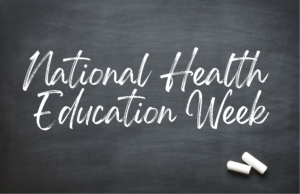
Students in FAMU’s Department of Health, Physical Education and Recreation held a virtual seminar Thursday for National Health Week, focusing on the COVID-19 pandemic and racial inequity. This seminar was sponsored by FAMU’s College of Education, Department of Health, Physical Education & Recreation, College of Pharmacy & Pharmaceutical Sciences, and the Institute of Public Health and Student Health Services.
The seminar featured panelists Perry Brown, professor of public health at the Institute of Public Health at FAMU; Tanya Tatum, director of FAMU’s Student Health Services; and Jocelyn Spates, professor and associate dean in COPPS.
Maria Okeke, and Kristine Fleming, both professors at FAMU for the Department of Health, Physical Education & Recreation, moderated the seminar.
“For over 25 years, the Society for Public Health Education has celebrated National Health Education Week to increase national awareness on major public health issues while promoting a better understanding of the role health education plays,” Fleming said. “This year’s theme ‘Gateway to the Future: The Power of Health Education & Promotion’ is essential as we continue to combat COVID-19.”
The seminar aimed to combat misinformation and misconceptions surrounding the impact of COVID-19 and the importance of vaccines.
“Although mainstream media has reported a drop in COVID-19 cases in Florida, during the past month, the testing among African Americans and Blacks living in Florida continues to remain the lowest throughout the state. Black and African Americans continue to feel the effects of COVID-19, which includes being more likely to be hospitalized and die from COVID-19 at disproportionate rates compared to people who are Latinx and white,” Flemming said.
The panelists debunked misinformation and misconceptions of COVID-19 while educating students on the importance of receiving the COVID-19 vaccine.
“One of the biggest things that we deal with … is just the vaccine hesitancy. We’ve seen so much of that; it is due to so many different variables — lack of education, misinformation, inability to even access the vaccine. Even though we have placed [the vaccine] in a lot of underrepresented communities, there’s still accessibility issues that exist, especially for people who may not have transportation,” Spates said. “Medical mistrust is a big thing. We’re still fighting an uphill battle trying to encourage people and educate people to get vaccinated.”
Tatum addressed the value of early testing.
“Access to testing at the beginning of the pandemic was one of the most important means so we could have early detection,” she said. “So far, to date, we’ve given out 18,481 vaccines, and 75 percent of those have been to individuals of color. So, I’m extremely grateful and proud that we’re reaching the people we wanted to reach. Not enough, but still it’s certainly met the goals we set out for it.”
After each panelist shared, the floor was opened to students to ask questions for the panelists.
Zoom user Andrew Bourque presented the question of how we could ever convince the entire population to receive the COVID-19 vaccine.
“I just don’t understand how it would ever be possible to have everyone vaccinated,” Bourque said.
“One of the characteristics of the majority of COVID cases is a fairly mild course of illness, and people get over it. There are many people who will look at the characteristics of the infection and rationalize why they don’t want to get vaccinated,” Brown said. “I would think the more serious the infection, that if this infection killed 20 to 30 percent of people who got infected, the lines for getting vaccinated would wrap around FAMU as opposed to ‘oh well, if I get COVID, I’ll get over it.’
“There’s a certain percentage who will not get over it, and I would ask someone who says that, “Are you willing to be the two out of one hundred who die?”
The seminar ended with final remarks from Okeke.
“Put together and implement this awesome seminar,” Okeke said. “I want all of us to remember only thirty-six percent of our people have been vaccinated, but we have a higher rate of hospitalization. You, our students, are the future hope of our community. You all will be our ambassadors to go into our community to educate our family members and others…Let’s start right here at FAMU.”
Contact Maria Okeke (maria. okeke @famu.edu) or Kristine Fleming (kristine.fleming@famu.edu) for additional information regarding the seminar.